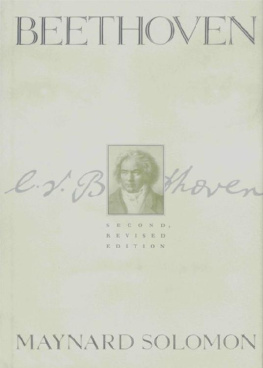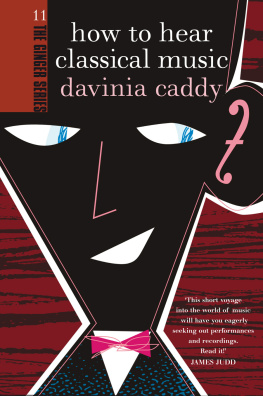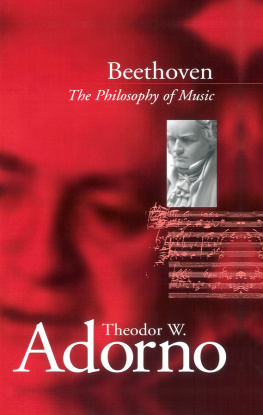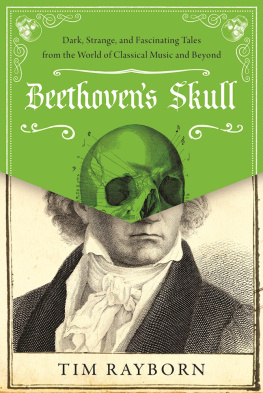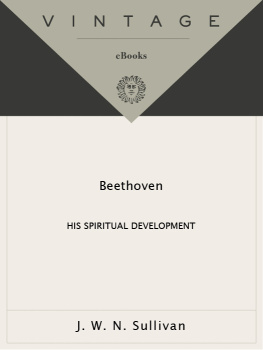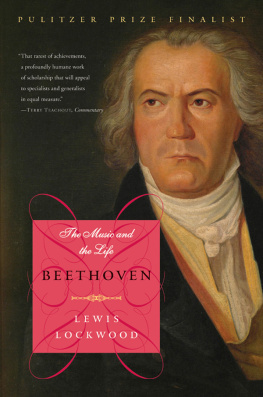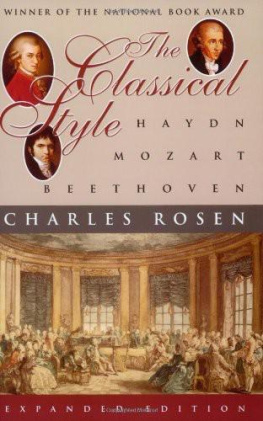
Beethovens birthplace, Bonngasse 515. View from the garden.
From Verein Beethovenhaus in Bonn, 18891904 (Bonn, 1904). Beethovenhaus, Bonn.

Copyright 1998 Maynard Solomon
This edition 2012 Schirmer Trade
(A Division of Music Sales Limited, 1415 Berners Street, London W1T 3LJ)
EISBN: 978-0-85712-813-3
The Author hereby asserts his / her right to be identified as the author of this work in accordance with Sections 77 to 78 of the Copyright, Designs and Patents Act 1988.
All rights reserved. No part of this book may be reproduced in any form or by any electronic or mechanical means, including information storage and retrieval systems, without permission in writing from the publisher, except by a reviewer who may quote brief passages.
Every effort has been made to trace the copyright holders of the photographs in this book, but one or two were unreachable. We would be grateful if the photographers concerned would contact us.
A catalogue record of this book is available from the British Library.
For all your musical needs including instruments, sheet music and accessories, visit www.musicroom.com
For on-demand sheet music straight to your home printer, visit www.sheetmusicdirect.com
For Eva and for Mark, Nina, and Maury
Contents
Preface to the First Edition
G REAT MEN ARE UNDERSTANDABLY ambivalent about the prospect of their posthumous biographies. Some have attempted to dissuade potential biographers or even to prevent them from obtaining data of an intimate nature, arguing that their creative achievement should be evaluated without regard to its biographical sources. Beethoven, however, had been raised on Plutarchs Lives, in which the heroes flaws are given a weight equal to their redeeming qualities. There is no sign of fear that the assessment of his music would be adversely affected by a full knowledge of the facts of his life. True, in 1820 he declined an offer by one of his literary friends to furnish an accurate biographical sketch to a German encyclopedia that had published misinformation about his ancestry.
Precisely what he gave to Holz is not quite clear, but we do know that at his death Beethoven left as rich a mass of documentary material as any composer in history. Included were a large number of manuscript scores of works, both published and unpublished; a profusion of sketch-leaves and sketchbooks, the study of which has led to a clearer understanding of Beethovens creative process; his library, which included several books in which he had underscored favorite and meaningful passages; and the unparalleled collection of 137 notebooksthe Conversation Bookscontaining uncensored personal conversations between the deaf composer and his associates during his final decade.
More dramatic than these, perhaps, were several other documents found in his effects, such as the Heiligenstadt Testament of October 610, 1802, in which Beethoven exorcised his suicidal impulses and declared his determination to resist adversity; his Tagebuch (diary) of 181218, in which we may observe Beethoven in his most vulnerable and self-questioning moods; and his passionate letter to an unidentified woman (whom he called my Immortal Beloved), written on July 6 and 7 of an unspecified year. Regrettably, he preserved relatively few of the letters that he received over the years, but this is most likely because he considered them superfluous; we have no reason to suspect that Beethoven prepared bonfires analogous to those that Charles Dickens and Henry James lit to keep their personal correspondence from reaching posterity.
It is a reasonable assumption, then, that Beethoven wished us to know something more about him than a mere chronology of his life and work. He wanted understanding as well, as though sensing that both forgiveness and sympathy inevitably follow in its train. As an artist and as a man, he knew the healing power of communication and the cathartic effect of shared fears. All evil is mysterious and appears greater when viewed alone, he wrote in a diary entry of 1817. It is all the more ordinary, the more one talks about it with others; it is easier to endure because that which we fear becomes totally known; it seems as if one has overcome some great evil.
Unfortunatelyand inevitablyBeethovens hope that the facts of his life would be presented in an ungarbled and unvarnished form was not soon to be fulfilled. Before the year of his death was over, a hasty and error-filled biography, by Johann Aloys Schlosser, was published in Prague. More fatefully, Anton Schindler, his former assistant and secretary, removed many of the most important documents, which lay unguarded in Beethovens lodgings, and converted them into his private property, until, in 1845, he sold most of the collection to the King of Prussia in exchange for a large sum in cash and a lifetime annuity. His much-translated and often-reprinted biography of Beethoven (1840, with revised and enlarged editions in 1845 and 1860) largely shaped the nineteenth-century conception of the composer, and it has continued to exert its influence in our own time. It was not until the publication between 1866 and 1879 of the first three volumes of a biography by the American writer Alexander Wheelock Thayer (181797) that Schindlers unreliable portrait was seriously challenged and the main outlines of Beethovens life faithfully reconstructed. After Thayers death, his biography of Beethovenwhich had been published only in German translationwas completed and revised by Hermann Deiters and Hugo Riemann (190117); the original English manuscript was edited and completed by Henry E. Krehbiel (1921), and was reedited by Elliot Forbes (1964; revised edition, 1967), who skillfully incorporated into it many of the findings of modern research, while paring away some of Thayers misconceptions and digressions. Thayer remains the indispensable biography of Beethoven, but his strictly chronological, year-by-year method of documentationand his avoidance of any discussion of the music other than the details of Beethovens productivitydid not permit him or his editors to illuminate the composers psychological development, to deal with his personal relationships in their evolution, or to demonstrate any significant connections between his life and his works.
The reader who consults the bibliographical essay that closes this book will discover that the work of Beethoven documentation began rather than ended with the work of Thayer and his scholarly contemporaries Ludwig Nohl and Gustav Nottebohm. (Indeed, the accurate reconstruction of the chronology of Beethovens works has been made possible only in recent decades through the careful study of his sketches and autograph manuscripts.) Scholars such as A. C. Kalischer, Theodor von Frimmel, Ludwig Schiedermair, Romain Rolland, Max Unger, Jacques-Gabriel Prodhomme, Stephan Ley, Joseph Schmidt-Grg, Georg Kinsky, Hans Halm, Donald W. MacArdle, Emily Anderson, and Alan Tysonto name only a fewdevoted decades of their lives to the accumulation of data and to the careful construction of a factual foundation for Beethoven studies.
The proper study of Beethoven is based on contemporary documentson letters, diaries, Conversation Books, court and parish records, autograph manuscripts and sketches, music publications, reviews, concert programs, and similar materials. These may be utilized by a biographer with relative confidence as to their authenticity, although even they, as we shall see, must be approached with some caution. A second major source of material bearing significantly on Beethovens life and personality consists of the reminiscences of his contemporaries. Here more serious questions arise as to the validity of anecdotes, reports, and memoirs that were written down long after the fact by a wide variety of individuals. The extent of the dangers involved in the use of contemporary documents was dramatically illustrated in March 1977 at the Berlin Beethoven-Kongress, where a long-held suspicion was finally confirmed. Working with handwriting analysis, Grita Herre and Dagmar Beck proved that Schindler had fabricated more than 150 of his own entries in the Conversation Books. Until then these entries had been unhesitatingly accepted as authentic by Beethoven scholars; some of Schindlers forgeries had formed the basis for extensive biographical and musical interpretations. It is true that Thayer had little confidence in Schindlers testimony, and ever since Thayer published his
Next page
